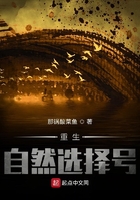I had not expected this. I had seen so little of the life of pleasure that I had failed to reckon with this violence of the amateurs.
And as for me, I was out of it. I was like a man who might have prevented the firing of a magazine. The time had gone. I was no one; the vainest stripling with a badge counted for more than I. The crowd jostled us and bawled in our ears; that accursed song deafened us; a woman shrieked at my lady because no badge was on her, and we two went back to our own place again, ruffled and insulted--my lady white and silent, and I aquiver with rage. So furious was I, I could have quarrelled with her if I could have found one shade of accusation in her eyes.
"All my magnificence had gone from me. I walked up and down our rock cell, and outside was the darkling sea and a light to the southward that flared and passed and came again.
"'We must get out of this place,' I said over and over. 'I have made my choice, and I will have no hand in these troubles. I will have nothing of this war. We have taken our lives out of all these things. This is no refuge for us. Let us go.'
"And the next day we were already in flight from the war that covered the world.
"And all the rest was Flight--all the rest was Flight."
He mused darkly.
"How much was there of it?"
He made no answer.
"How many days?"
His face was white and drawn and his hands were clenched. He took no heed of my curiosity.
I tried to draw him back to his story with questions.
"Where did you go?" I said.
"When?"
"When you left Capri."
"Southwest," he said, and glanced at me for a second. "We went in a boat."
"But I should have thought an aeroplane?"
"They had been seized."
I questioned him no more. Presently I thought he was beginning again. He broke out in an argumentative monotone:
"But why should it be? If, indeed, this battle, this slaughter and stress IS life, why have we this craving for pleasure and beauty?
If there IS no refuge, if there is no place of peace, and if all our dreams of quiet places are a folly and a snare, why have we such dreams? Surely it was no ignoble cravings, no base intentions, had brought us to this; it was Love had isolated us. Love had come to me with her eyes and robed in her beauty, more glorious than all else in life, in the very shape and colour of life, and summoned me away. I had silenced all the voices, I had answered all the questions--I had come to her. And suddenly there was nothing but War and Death!"
I had an inspiration. "After all," I said, "it could have been only a dream."
"A dream!" he cried, flaming upon me, "a dream--when even now--"
For the first time he became animated. A faint flush crept into his cheek. He raised his open hand and clenched it, and dropped it to his knee. He spoke, looking away from me, and for all the rest of the time he looked away. "We are but phantoms," he said, "and the phantoms of phantoms, desires like cloud shadows and wills of straw that eddy in the wind; the days pass, use and wont carry us through as a train carries the shadow of its lights, so be it!
But one thing is real and certain, one thing is no dreamstuff, but eternal and enduring. It is the centre of my life, and all other things about it are subordinate or altogether vain. I loved her, that woman of a dream. And she and I are dead together!
"A dream! How can it be a dream, when it drenched a living life with unappeasable sorrow, when it makes all that I have lived for and cared for, worthless and unmeaning?
"Until that very moment when she was killed I believed we had still a chance of getting away," he said. "All through the night and morning that we sailed across the sea from Capri to Salerno, we talked of escape. We were full of hope, and it clung about us to the end, hope for the life together we should lead, out of it all, out of the battle and struggle, the wild and empty passions, the empty arbitrary 'thou shalt' and 'thou shalt not' of the world.
We were uplifted, as though our quest was a holy thing, as though love for one another was a mission. . . .
"Even when from our boat we saw the fair face of that great rock Capri--already scarred and gashed by the gun emplacements and hiding-places that were to make it a fastness--we reckoned nothing of the imminent slaughter, though the fury of preparation hung about in puffs and clouds of dust at a hundred points amidst the grey; but, indeed, I made a text of that and talked. There, you know, was the rock, still beautiful, for all its scars, with its countless windows and arches and ways, tier upon tier, for a thousand feet, a vast carving of grey, broken by vine-clad terraces, and lemon and orange groves, and masses of agave and prickly pear, and puffs of almond blossom. And out under the archway that is built over the Piccola Marina other boats were coming; and as we came round the cape and within sight of the mainland, another little string of boats came into view, driving before the wind towards the southwest.
In a little while a multitude had come out, the remoter just little specks of ultramarine in the shadow of the eastward cliff.
"'It is love and reason,' I said, 'fleeing from all this madness, of war.'
"And though we presently saw a squadron of aeroplanes flying across the southern sky we did not heed it. There it was--a line of little dots in the sky--and then more, dotting the southeastern horizon, and then still more, until all that quarter of the sky was stippled with blue specks. Now they were all thin little strokes of blue, and now one and now a multitude would heel and catch the sun and become short flashes of light. They came rising and falling and growing larger, like some huge flight of gulls or rooks, or such-like birds moving with a marvellous uniformity, and ever as they drew nearer they spread over a greater width of sky.















